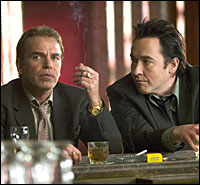 Bee Season (Richard Gere, Flora Cross, Juliette Binoche, Max Minghella, dir. Scott McGehee and David Siegel)
Bee Season (Richard Gere, Flora Cross, Juliette Binoche, Max Minghella, dir. Scott McGehee and David Siegel)My review in Las Vegas Weekly
I was hoping to like this movie, but honestly the only parts that I found remotely interesting were the spelling bees, and only then because I enjoyed trying to spell the words (I am a spelling bee fanatic), not because of any dramatic engagement. The main character even won a trophy with a bespectacled bee exactly like one that I have from fifth grade. That was a nice nostalgic twinge. The movie, however, not so good. Opened limited Nov. 11 ; in Las Vegas this week
 The Dying Gaul (Peter Sarsgaard, Patricia Clarkson, Campbell Scott, dir. Craig Lucas)
The Dying Gaul (Peter Sarsgaard, Patricia Clarkson, Campbell Scott, dir. Craig Lucas)Thanks to the vagaries of indie movie scheduling here in Vegas, we missed running this review in Las Vegas Weekly this week. But I saw the movie and wrote the review, dammit, so here it is in its entirety as it would have run in the paper:
Someone in Hollywood needs to declare a moratorium on featuring instant message conversations in films. No matter how they’re dressed up with visual flourishes and voice-over, conversations involving two people typing to each other on computers are inherently un-filmic and are nearly guaranteed to grind any movie to a halt. Used fleetingly in a scene or two, such conversations can be forgivable. But The Dying Gaul, the directorial debut of playwright and screenwriter Craig Lucas, is built almost entirely on these sorts of exchanges.
Set in 1995, Gaul follows aspiring screenwriter Robert (Sarsgaard), a gay man whose lover recently died of AIDS. He writes a screenplay (also called The Dying Gaul) inspired by his experience, which catches the attention of studio executive Jeffrey (Scott). Jeffrey’s hot on buying the screenplay, with one caveat: The gay couple at the center has to be changed to a heterosexual couple.
Strangely enough, the struggle over the script isn’t even the movie’s central focus; Robert gives in rather easily, and the issue essentially disappears as the film goes on. What it’s really about is a developing love triangle that also includes Jeffrey’s wife Elaine (Clarkson). A closeted bisexual, Jeffrey starts up an affair with Robert, who is still grieving over his lover’s death. Elaine, unaware of the affair, takes an instant liking to Robert, and in a misguided attempt to get to know him better poses as another gay man in an online chatroom.
From there, things get much more complicated, but unfortunately nearly all of the complications involve a lot more Internet chatting, which is the least dramatically compelling device Lucas could use to tell the story. The movie turns into a dark psychological thriller, with all three main characters acting in various reprehensible ways, Elaine especially turning from the friendly person she first appears to be into a vindictive, manipulative harpy.
It all ends like a Shakespearean tragedy, except with instant messages. Lucas seems to be going for grand and shocking, but he only ends up with muddled and unconvincing. Rather than sadness at the fate of the ugly characters, the main effect is relief. The efforts to capture a particular moment that’s so recently passed only serve to make the movie feel dated, with its quaint approaches to both technology and sexuality. Despite a strong cast, the movie is awkward and off-putting—much like instant messages. Opened limited Nov. 4; in Las Vegas this week
 The Ice Harvest (John Cusack, Billy Bob Thornton, Connie Nielsen, Oliver Platt, dir. Harold Ramis)
The Ice Harvest (John Cusack, Billy Bob Thornton, Connie Nielsen, Oliver Platt, dir. Harold Ramis)This was a real disappointment for me, since I love pretty much everyone involved (Cusack, Thornton, Ramis). For having such high billing, Thornton actually has a very small part, and doesn't get to do much aside from utter a few funny lines. This is Cusack's movie all the way, and it's the right kind of part for him, a sad sack functionary looking for a new start, but the script is cobbled together from a lot of much better neo-noirs (see Fargo, or Thornton himself in A Simple Plan, or even Cusack in Grosse Point Blank), with lazy plotting and weak humor. There are some funny moments, and the cast has enough charisma that the movie isn't painful to sit through (Nielsen does a great femme fatale), but overall it all feels very made-for-cable, which is too bad. Wide release
 Rent (Rosario Dawson, Adam Pascal, Anthony Rapp, Jesse L. Martin, dir. Chris Columbus)
Rent (Rosario Dawson, Adam Pascal, Anthony Rapp, Jesse L. Martin, dir. Chris Columbus)First of all, I am not generally a fan of musicals, so I always go into a movie like this with skepticism. But I try to be fair, and I know that "there was too much singing" is not a valid criticism. I've not seen the play, but from everything people tell me, the film is incredibly faithful, and, judging by the screening I went to, is guaranteed to please the hardcore fans. If you love the play, you'll love the movie, and anything I say is pretty much irrelevant. That faithfulness (which also includes using almost all of the original Broadway cast) is great for those people who see the play as a precious, untouchable artifact, but it's not so great for the film's existence as its own entity. Like he did with his Harry Potter movies, Columbus doesn't so much make a movie as he just films the play. Yes, it's shot on real New York City streets, but they're still decorated in such a way that they look like soundstages, and the whole thing feels confined, like it takes place in a fantasy world.
The other problem is that, whether intentionally or not, the film makes having AIDS and being poor look glamorous and fun. Yes, there is a death, but it's not a main character, and it's used more as a crutch to develop the other characters than as a tragedy for the one who dies, who is the most over-the-top caricature in the whole film as it is. The ending, which I won't spoil, is the worst kind of rosy cop-out, one that makes it seem like AIDS may be bad, but a little love and some pretty singing can make it all better. Watching the film reminded me a lot of watching Angels in America, in that both were probably revolutionary when they were first staged back in the early or mid 90s, but nowadays they just come off as quaint and even a little naive.
I realize this makes it sound like I hated the film, which I didn't. The acting is fine and the music is good. It does exactly what it needs to do to please its audience. That just wasn't enough for me. Wide release
No comments:
Post a Comment